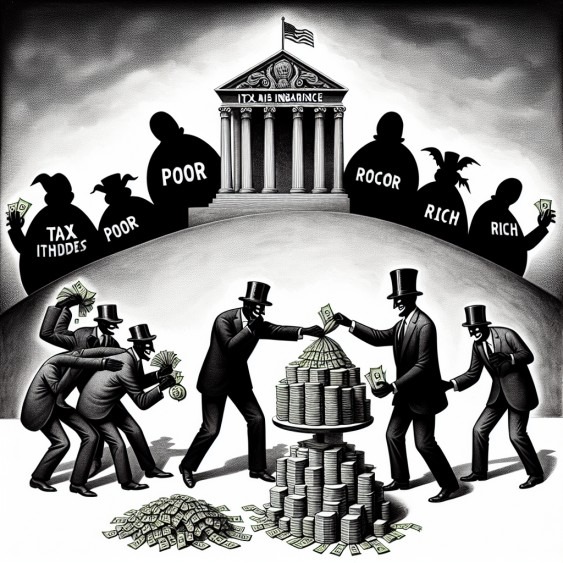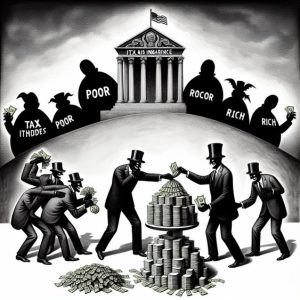
IRS Thieves: Targeting the Vulnerable, Benefiting the Wealthy
March 31, 2024
Introduction
The Internal Revenue Service (IRS), an agency tasked with collecting taxes and enforcing tax laws, has been intensely scrutinised in recent years for its seemingly inequitable treatment of taxpayers. Allegations of bias and preferential treatment have surfaced, with claims that the IRS targets the underprivileged while turning a blind eye to, or even aiding, the wealthy. This essay explores these accusations, examining the latest data, incidents, and expert opinions to understand the IRS’s controversial practices comprehensively.
The IRS Under Fire: Data and Incidents
In 2023, the IRS was involved in a scandal involving the unauthorized access of taxpayer information. Cybercriminals exploited the “Get Transcript” system, allowing taxpayers to retrieve previous years’ tax filings and steal sensitive data. This revelation shocked the nation, indicating a severe security and privacy breach. The incident exposed the personal information of approximately 334,000 taxpayers, with the IRS believing the perpetrators to be part of a sophisticated criminal operation based in Russia.
This incident is just one example of how the IRS has failed to protect the sensitive information of taxpayers, especially those from lower socio-economic backgrounds. In their haste to obtain refunds, many low-income individuals and families use this system, making them easy targets for identity thieves. The IRS’s failure to safeguard their information has had devastating consequences, with victims facing financial losses, damaged credit scores, and increased vulnerability to further fraud.
The IRS’s incompetence in preventing these crimes starkly contrasts their zealous pursuit of minor infractions made by low-income taxpayers. For instance, the agency has quickly penalised taxpayers who underreport income or make honest mistakes on their tax returns, often imposing hefty fines that disproportionately affect those of modest means. This selective enforcement of tax laws contributes to the perception of the IRS as an institution that preys on the vulnerable while showing leniency to the affluent.
Targeting the Weak, Sparing the Wealthy
The IRS’s biased treatment extends beyond its failure to protect taxpayer information. Numerous incidents and investigations have revealed a pattern of targeting underprivileged individuals and small businesses while exhibiting leniency toward the wealthy and well-connected. A 2023 report by the National Taxpayer Advocate, an independent organization within the IRS, found that low-income taxpayers were more likely to be audited than those with higher incomes. This disproportionate auditing reflects a disturbing trend where the IRS allocates its resources to scrutinize those who can least afford it, often resulting in financial hardship for those already struggling.
In contrast, the IRS has a history of going easy on the rich and powerful. A notable example is the treatment of large corporations and the ultra-wealthy during the COVID-19 pandemic. While small businesses and self-employed individuals faced intense scrutiny and delays in receiving emergency relief funds, large corporations received swift approvals for loans and grants with minimal oversight. This double standard further reinforces the perception of an IRS that favours the wealthy and burdens the poor.
Fraud and Injustice Within the IRS
Adding insult to injury are the instances of fraud and misconduct within the IRS. In 2022, an IRS employee was sentenced to three years in prison for conspiring to defraud the government. The employee and several co-conspirators exploited the child tax credit program by filing fraudulent tax returns and directing refunds to their personal bank accounts. This incident not only highlights the vulnerability of taxpayer information but also underscores the corruption within the institution tasked with enforcing tax laws.
In another case, an IRS agent was convicted of stealing taxpayer identities and using them to open credit card accounts, racking up thousands of dollars in fraudulent charges. Sadly, these are not isolated incidents. A 2022 report by the Treasury Inspector General for Tax Administration (TIGTA) revealed that the IRS had failed to adequately investigate and resolve employee misconduct cases, with some cases lingering for years without resolution. This culture of impunity within the IRS further erodes public trust and confidence in the agency’s ability to administer justice fairly.
The Human Impact: Real-Life Examples
The consequences of the IRS’s biased practices are felt most acutely by those who can least afford it. Consider the case of a low-income single mother who, due to an honest mistake on her tax return, found herself facing a hefty fine and the threat of wage garnishment. Unable to afford legal representation, she navigated the complex appeals process alone, enduring months of stress and anxiety. Ultimately, she succeeded in having the penalty abated, but the experience left her traumatized and disillusioned, questioning the fairness of a system that seemed designed to oppress rather than support.
Stories like these are all too familiar. Already struggling to stay afloat, small business owners have faced aggressive audits and unjustified tax bills, driving some to bankruptcy. Meanwhile, the ultra-wealthy seem to operate by a different set of rules, enjoying preferential treatment and loopholes that allow them to minimize their tax obligations. The IRS’s disparate treatment exacerbates social and economic inequalities, perpetuating a cycle of disadvantage for the poor.
Systemic Reform: A Necessary Step
The inequities and injustices perpetuated by the IRS demand systemic reform. While individual incidents of fraud or misconduct can be addressed through improved security measures and stricter employee screening, the underlying cultural and structural issues require a more comprehensive approach. Experts advocate for increased transparency and accountability within the IRS, including enhanced oversight by independent bodies.
Recommendations include expanding the authority of the National Taxpayer Advocate to ensure that low-income taxpayers receive adequate representation during audits and disputes. Additionally, there are calls for simplifying the tax code to reduce the complexity that often disadvantages those without specialized knowledge or access to expensive tax advisors.
Conclusion: Towards a Fair and Equitable Tax System
The IRS, an institution integral to the functioning of the US economy, has failed to uphold the principles of fairness and equity that should underpin taxation. The incidents and data presented in this essay paint a disturbing picture of an agency that perpetuated injustice and exacerbated social inequalities, whether through incompetence or malice.
While the IRS has taken steps to enhance security and address misconduct, much more must be done to restore public trust. Systemic reform is necessary to create a tax system that treats all taxpayers fairly, regardless of their socio-economic status. Only then can the IRS regain its legitimacy and fulfil its role as a just and impartial administrator of tax laws.
Expert Opinions on IRS Reform
Tax law and public policy experts have offered various suggestions to reform the IRS and improve its practices. Professor Ellen Aprill of Loyola Law School emphasizes the need for increased IRS funding, stating, “The IRS has been chronically underfunded, leading to a shortage of staff and resources. This hampers their ability to enforce tax laws and effectively provide adequate services to taxpayers.”
April also suggests enhancing the role of the National Taxpayer Advocate, ensuring they have the authority and resources to assist low-income taxpayers effectively. “The National Taxpayer Advocate is crucial in helping vulnerable taxpayers navigate the complex tax system. Expanding their reach and resources would provide much-needed support to those who need it most,” she adds.
Echoing these sentiments, Professor Benjamin Alamar of the University of California, Berkeley, School of Law advocates for structural changes within the IRS. He proposes creating specialized units within the agency, each focusing on a specific area of tax law, to improve expertise and efficiency. “By creating these units, the IRS can better serve taxpayers and ensure consistent application of tax laws,” Alamar explains.
Additionally, Alamar recommends increasing the IRS’s use of data analytics and artificial intelligence to identify and address non-compliance. “The IRS should leverage technology to streamline processes and improve accuracy. This would enhance their efficiency and reduce the burden on compliant taxpayers,” he suggests.
Preventing Fraud and Protecting Taxpayers
Experts propose a multi-pronged approach to address the issues of fraud and misconduct within the IRS. Professor Samantha Jacoby of the University of California, Los Angeles, School of Law emphasizes the need for more robust internal controls and oversight, stating, “The IRS must implement robust internal controls to detect and prevent employee fraud and misconduct. This includes regular audits, enhanced security measures, and a strict code of conduct for employees.”
Jacoby also suggests establishing an independent body to promptly investigate and resolve misconduct cases, ensuring accountability and transparency. “An external review process would provide an additional layer of oversight, improving public trust in the IRS’s ability to police itself,” she adds.
Professor April agrees, advocating for increased scrutiny of IRS employees, particularly those with access to sensitive taxpayer information. “Background checks, regular monitoring, and mandatory training on ethics and privacy should be mandatory for all employees handling taxpayer data,” she recommends.
Additionally, experts propose enhancing whistleblower protections to encourage IRS employees to report misconduct without fear of retaliation. “Creating a safe and supportive environment for whistleblowers is crucial to uncovering and addressing fraud within the IRS,” emphasizes Jacoby.
Restoring Public Trust
Restoring public trust in the IRS is a challenging but necessary endeavour. Experts suggest a combination of improved communication, increased transparency, and a demonstrated commitment to fairness and equity. Professor Alamar recommends that the IRS “enhance its public outreach and education initiatives to help taxpayers understand their rights and responsibilities, as well as the resources available to them.”
He also suggests that the IRS actively promote the use of its online tools and resources, which can empower taxpayers to take control of their tax obligations and reduce their reliance on paid preparers. “By providing user-friendly online resources, the IRS can improve taxpayer compliance and satisfaction,” Alamar adds.
Professor Jacoby emphasizes the importance of transparency, stating, “The IRS should regularly publish reports on its enforcement activities, audit rates, and demographic data of taxpayers audited. This level of transparency will help taxpayers understand the IRS’s practices and hold them accountable for any disparities or inequities.”
Additionally, she suggests that the IRS actively engage with taxpayer advocacy groups and community organizations to better understand the challenges low-income taxpayers face and develop targeted solutions. “By collaborating with these organizations, the IRS can demonstrate its commitment to fairness and equity,” Jacoby proposes.
Conclusion: A Call for Action
The issues plaguing the IRS demand immediate attention and reform. By implementing the suggestions outlined by experts and advocating for systemic changes, a tax system that treats all taxpayers fairly and equitably can be created. This essay has highlighted the injustices perpetrated by the IRS, particularly against the underprivileged, and the urgent need for change.
Lawmakers, policymakers, and IRS officials must heed these calls for reform to restore public trust and ensure a just and efficient tax administration. The future of the IRS and the fairness of the US tax system depend on it.
Other Stories of Interest:

Visionary Views: How to Achieve Financial Freedom Before 40

A Major Problem with ESOPs is That Employees Can Lose Big

The Sophisticated Guide to Cryptocurrency Investing for Dummies PDF

Considering the Impact of Inflation, Why Is Investing Important for Long-Term Financial Stability?

What the NASDAQ Composite is Trading at in Today’s Market

What Is Contrarian Investing Unleashing Creative Perspectives

ETF Newsletter: Customized Options for Astute Investors

ETF Service Providers: In-House Options for the Tactical Investor

Fearlessly Trade Your Way to Financial Freedom

Dow Jones Industrial Average Stocks Soar Slaughtering the Bears

IRS Thieves: Robbing the Poor, Aiding the Rich

Unlocking Radiance: Hemp Benefits for Skin Illumination

Dow 30 Stocks: What Do They Reveal

Stock Market Psychology Cycle: Unveiling Trends and Tactics

Contrarian Thinking: The Power of Challenging the Status Quo
What Is The Best Way For One To Recover After a Financial Disaster?


